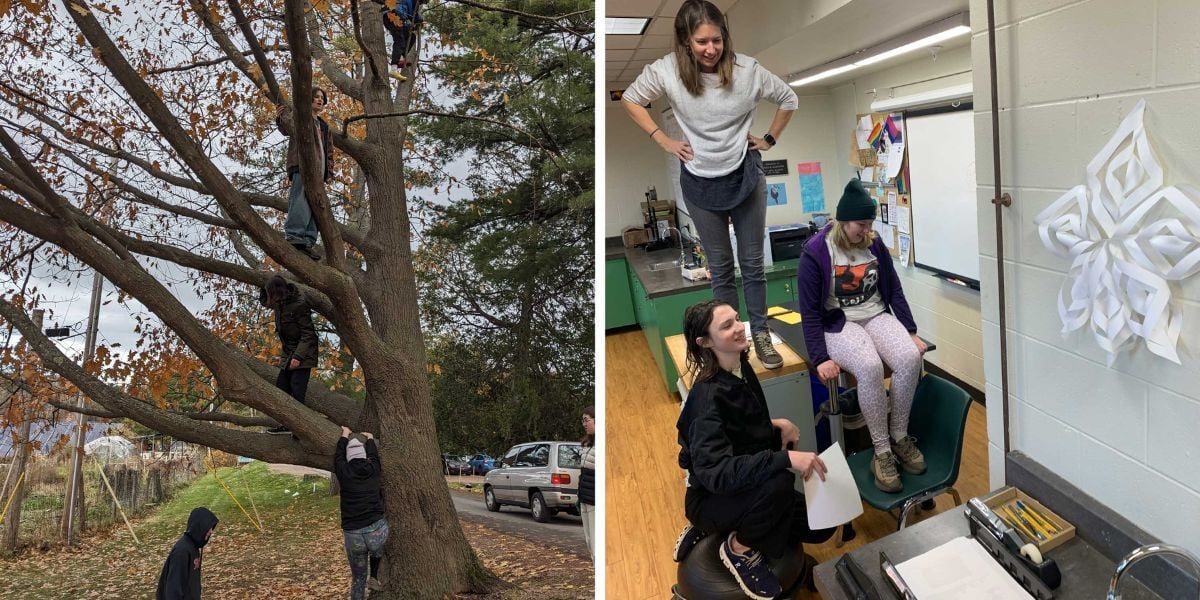Embracing the Unexpected: Building Skills Through Rock Point Electives
Every quarter, students choose from several electives, which meet three times a week to supplement the curriculum and provide a fun way to start...

 You may have heard that Malia Obama is taking a year ‘off’, known as a gap year, before she enters Harvard University in the fall of 2017. This news has brought lots of attention to what has become a trend - students taking a year between graduating high school and beginning college. To some, this seems like a luxury, and certainly there are luxurious excursion or adventure options for a gap year, but to others this year can be extremely beneficial and make their college experience more meaningful.
You may have heard that Malia Obama is taking a year ‘off’, known as a gap year, before she enters Harvard University in the fall of 2017. This news has brought lots of attention to what has become a trend - students taking a year between graduating high school and beginning college. To some, this seems like a luxury, and certainly there are luxurious excursion or adventure options for a gap year, but to others this year can be extremely beneficial and make their college experience more meaningful.
At Rock Point, we have always encouraged students to explore gap year programs as one of many post-high school options. Just as success is ultimately defined differently for each Rock Point student, the next best step following high school will vary. A gap year is often talked about as taking a "year off" before going to college, but at Rock Point School, we talk about a gap year as a "year on." We see a gap year as a chance to engage with existing or new interests, to immerse oneself in a new culture, to engage in service with Americorps or another service organization, to spend time in a country where one might have family roots, and much more. Students who take full advantage of a gap year often find that, when they enter college, they have a clearer sense of purpose and are more focused in their studies.
There are many reasons that a student may choose a gap year. Here are few that our own students have listed:
A recent article in the New York Times outlined the many benefits colleges see in students who have taken a gap year. University officials say that students who complete gap years are often more prepared for life on a college campus and are less likely to get derailed in their first year. Several universities are even offering their own gap years, some even giving students college credit for what they do in the year before they begin a course of study.
A gap year often involves more experiential education, usually through direct work and/or travel. The difference between a “gap year” and a “year off” is that students are enrolled in some kind of purposeful program, some more structured than others. If your soon-to-be graduate is interested in a gap year, here are some things you may want to help her/him think about.
A structured gap year experience is also likely to occur in a smaller community, where the young adult gets to experience his or her impact more directly, and may get more direct mentoring. Some are geared toward young adults who can benefit from additional mentoring and support before heading off to college. This kind of experience can be very beneficial for students who thrive in a place where they are known. Dynamy is one example of this kind of gap year experience, and several recent Rock Point graduates have had positive experiences with that internship-year program.
Gap year experiences vary widely: some call for a young adult to have more independent-living skills and maturity than the average college freshman. They may require you to rent an apartment, cook your own food, and transport yourself.
Service based gap years have also been successful for our students. City Year and Americorps NCCC, offer wonderful programs for young adults, particularly those interested in Human Services and Community Service. Vermont Youth Conservation Corps offers a farm experience for young people who are interested in agriculture and the environment, as well as ways to alleviate hunger in communities in Vermont. Internship programs may offer the opportunity to explore particular careers from law enforcement, to the arts, to animal care. Some programs, like NOLS (National Outdoor Leadership School) and Outward Bound, may focus on outdoor/adventure leadership training. Finally, there are hundreds of programs that offer the opportunity to become more proficient in another language and to work or volunteer in locations around the globe.
Most gap year programs charge a tuition fee, though there are a few that do not, or that even pay a stipend, or give room and board (such as Americorps and WWOOFing). Some students are able to work and live at home for part of their “gap year” because many programs are not a full year long. While there is a reputation that gap years are expensive, that is not always the case. It is important to do your research and be aware of what living expenses you will need to cover while completing your gap year. If your student has already been accepted to college, you may also want to check whether there will be any effect on financial aid, scholarships and grants if there is a one-year delay. Ultimately, the cost can pay off in the end because entering college more focused and ready may cut down on the years your child will attend college.
There is no right or wrong way to move forward after high school; what is important is that students consider a wide range of options, and decide what's right for them as individuals. When considering the next step, keep an open mind and do your research. Consulting with a guidance counselor (at Rock Point School, our seniors attend a seminar with our guidance counselor during the first semester to help them with post-high school planning) or an educational consultant can be very helpful when you’re sorting through so many options.
In addition to the various gap year opportunities listed above, here is a link to a list of gap year programs whose representatives travel the country and attend gap year fairs, where you can talk in person with representatives from programs and also investigate a number of programs at once.

Every quarter, students choose from several electives, which meet three times a week to supplement the curriculum and provide a fun way to start...

“May your choices reflect your hopes, not your fears.” - Nelson Mandela

“Writing is like driving at night; you can only see as far as the headlights, but you can make the whole trip that way.” - E.L Doctorow While E.L...